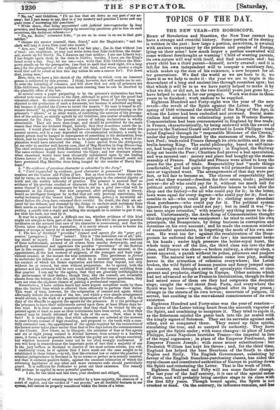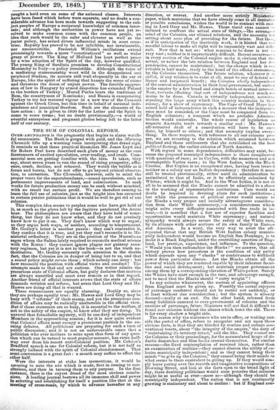TOPICS OF THE DAY.
THE NEW YEAR—ITS HOROSCOPE.
BORN of Revolution and Reaction, the New Year cannot but have a strange and eventful history. Some portion of its destiny is written in the past : how large a portion, unwritten, is awaited with anxious expectancy by the princes and peoples of Europe, lying on their arms ! how much larger a portion unawaited will come without forethought or warning ! Child of warring parents, its own nature will war with itself, and find uncertain end : but every child has a third parent—himself, newly created ; and it is left for his own independent will to conquer a residuary fate, which makes up the sum of his existence, a new bequest for af- ter generations. We find the world as we are born to it, we leave it as we help to make it : the year we are to begin is the descendant of a long and ancient line through countless ages ; but that which it will be to us we have partly helped to make it by what we did, or did not, in the two fruitful years just gone by,— have helped to make it for our progeny. Work was done in those years to be finished ; work undone to be supplied. Eighteen Hundred and Forty-eight was the year of the new revolt—the revolt of the Spirit against the Letter. The early spring of 1848 witnessed the downfall of the King of the Age, in whom the Letter had been embodied and crowned. Social mate- rialism had attained its culminating point in Western Europe. Commercialism had been consummated in England by free trade; in France, characteristically, by being endowed with the sword of power in the National Guard and crowned in Louis Philippe : trade ruled England through its " responsible Minister of the Crown," under the policy bequeathed by the statesman of trade, Sir Ro- bert Peel ; trade ruled France through its civic militia and its um- brella-bearing King. The social philosophy, based on self-inter- est, had bought out the old aristocracy : in England, the Railway King sat beside the Peer ; Chartism had proved a bad speculation, and was sneered out : money and place had bought up the states- manship of France. England and France were allied to keep the peace for the good of trade. Respectability had "made things comfortable," and had quite forgotten wild primordial human na- ture or vagabond want. The arrangements of that day were per- fect, or bid fair to become so. The classes of respectability had just what they wanted—freedom for their estate, trade ; political power—for all who could pay for it, without too much call for political activity ; peace, and therefore leisure to look after the shop and the factory—for all who could pay for it ; in the letter, laws were equal for every degree—who could pay for it; food ac- cessible to all—who could pay for it ; clothing more abundant than purchasers—who could pay for it. The political system ignored the people that could not pay ; but in itself it was " to- tus teres atque rotundus," with scarcely anything more to be de- sired. Unfortunately, the Arch-King of Commercialism thought that the paying power was omnipotent : he tried to outbid his own principals, the Bourgeoisie, by doing business in corruption and dotations on his own account ; and he made the common mistake of successful speculators, in forgetting the mode of his own suc- cess. He went too far : against the recalcitration of the Bour- geoisie he enforced the letter of the law ; his instrument broke in his hands ; under high pressure the boiler-royal burst, the whole train went off the line, the third class ran into the first class, and France was chaos—a broken railway, a shut-up shop, a street unpaved, a parish without its police, prisoners and paupers loose. The natural laws of mechanics came into play, making havoc in the attraction of cohesion everywhere; the Letter broken, the wild Spirit of human passion and fancy jumped upon the counter, ran through a series of apocalyptic visions, at once present and prophetic, startling to Europe. Other nations which had not advanced so far as France in literalization, though its frost had seized some of them ere they had outgrown the despotic stage, caught the wild shout' from Paris, and everywhere the Spirit was let loose—vague, dim-sighted after its long prison ; strange in the streets of its own towns ; uncertain of purpose, ill served, but exulting in the reawakened consciousness of its own existence.
Eighteen Hundred and Forty-nine was the year of reaction— the slaves of the Letter taking heart from the uncouth vagaries of the Spirit, and combining to recapture it. They tried to cajole it, as the fisherman cajoled the genie back into the jar sealed with the kingly signet of Solomon. They set its servants against each other, and so conquered them. They raised up false spirits, simulating the true, and so usurped its authority. They have again got the Spirit under ; with some changes : in place of Louis Philippe, Louis Napoleon bestrides France—the imperial in lieu of the regal cognomen ; in place of the Emperor Ferdinand, the Emperor Francis Joseph ; with some minor substitutions : but Frederick William has kept his throne ; and, for the third time, England has helped the base Bourbons of the South to cheat Naples and Sicily. The English Government, subsisting by favour of the English franchise-purchasing classes, has aided the royal classes and constituted authorities of Europe in putting down the Spirit and reinstating the Letter. That is the work of 1849.
Eighteen Hundred and Fifty will see some further change. The last year of the half century, it is one of this special senes of three, and will probably bring another stage to its close with the first fifty years. Though bound again, the Spirit is not crushed or dead. On the contrary, its influence remains, and has
caught a hold even on some of the unbound classes. Interests have been fused which before were separate, and no doubt a con- siderable advance has been made towards suggesting to the sub- ject peoples of Europe a reciprocal knowledge of common inter. eats ; and although the authorities in power have not yet re- solved to make common cause with the common people, an idea that such would be the safer and cleverer as well as the juster policy, has seized divers influential minds in most coun- tries. Royalty has proved to be not infallible, nor invulnerable, nor unconvertible. Frederick William's oscillations extend promisingly towards a more "constitutional" as well as wider grasp of power. The King of Holland has kept perfect peace by a wise adoption of the Spirit of the day, however qualified. The young King of Sardinia promises to develop Constitutional Monarchy in Italy—a policy irresistible. Although the voice of a mediating statesmanship went wild in the disappointed and perplexed Stadion, its accents still wail eloquently in the ear of Europe, like the spirit of suffering that haunts the scene of crime and threatens the doom of unjust power. The forcible suppres- sion of law in Hungary by armed despotism has extended Poland to the borders of Turkey ; Murad Paella bears the traditions of Bern, the countryman of Kosciusko; and Russia is exasperating Turkey to try her restored vigour in a new war of the Crescent against the Greek Cross, but this time in behalf of national inde- pendence and municipal freedom. Such are the elements of fu- ture action : it is given to 1850 for the Letter and the Spirit to come to some terms; but no doubt provisionally,—a world of eventful enterprises and pregnant glories being left to the latter half of our century.



























 Previous page
Previous page